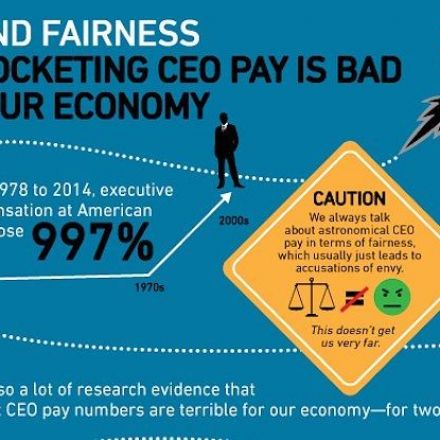

10 years ago
16
Don't blame your expensive lunch on minimum wage increases
Chipotle is just the latest company in the city to claim labor costs as the reason for price hikes. It sounds logical. Wages go up 10%, prices of menu items go up 10%. It’s fair, right? But Chipotle co-CEOs Steve Ells and Monty Moran’s earnings in 2014 were $28.9m and $28.2m, respectively. Ells also brought in around $42m in stock options in 2014, yet prices must go up because the lowest paid workers received a $1 raise?
Continue Reading-
Prices Rise At Starbucks And Chipotle As Workers Get Raises
Many consumers have spoken in favor of wage increases. Their support will be tested as companies respond by raising the price of food.



























Join the Discussion
Most of these reasons are just excuses made by people who simply don't understand, or believe in Capitalism. In capitalism the market sets the price; not the provider. If the prices go up 10%, and the market rejects that price, the prices will go back down to where they were. It's the job of the providers to find the maximum price that the market is willing to pay for the item. What it costs to produce that item has very little meaning.
Of course if that item costs more to make than what the market will pay for it, then the item simply will not be made. However to suggest that changing the cost of the production of the item has any effect on the market price shows ignorance on capitalist principals. I will point out although that if the consumer is earning more money they are willing to spend more on a given item. So if the average worker is making more money of course prices are going to increase on a commodity like Chipotle burritos.
I''m glad you brought this up, I find it impossible to explain this basic concept of pricing to people.
Having said that though, the food service industry is so competitive that margins are pushed down to near zero. So the price of production has more effect on pricing the most other industries.
I think this part hits the hardest:
The fact that people are supporting families on these sorts of wages, and are oftentimes the people who need the most help in our society, is pretty disheartening.
Great comment on the article
It's sadly a classic tactic to divert blame for those truly at fault, the mega-rich, by setting the middle and lower class on each other like rabid dogs so their class conflict keeps them distracted from the real problem going on. At least now I can add Chipotle and Starbucks to my list of companies to not buy from, along with Papa John's and others.
They do it because it works. What's more, it's been working for a long time.
Can we blame some of it on Fed policy of running the money printing machine on warp drive, or do we have to just blame CEO salaries?
Sure, if you could demonstrate that effect. Supply-siders and goldbugs have been making that argument for three generations now and they've yet to present conclusive evidence that invalidates classical economics.
Considering that this problem really started spiraling when we abandoned classical economic solutions to monetary crisis, I think we can safely say that wage income is at the heart of this problem rather than the hyperinflation claim.
How much of this is also price correction, and not just the wage increase? I just paid $6.85 for a chipotle burrito, which according to BLS is equivalent to $4.16 when Chipotle was founded.
Admittedly, it's a little problematic to expect companies to keep up with inflation, when inflation numbers are based on the prices they set, but at least some of the price increase is building in other factors, since customers seem to prefer occassional, larger increase rather than frequent small increases.
I've never understood the reason people bash multimillion dollar CEO incomes. Yes - They are the TOP of the food chain. It might seem like a ton of money, but most times I would say they earned it. I realize not all CEO's are the founders, but they aren't your average run of the mill employee either. Do I think they get paid a lot? Yes. I also think that they should.
Because CEO incomes have been rising exponentially while 90% of other incomes are stagnating or in decline. According to my research Chipotle employs approximately fifty-nine thousand workers (rounded down). Chipotle's two CEOs made between them fifty-seven million dollars (also rounded down) last year. If both CEOs gave up just one million dollars of compensation to go toward employee wages then each employee could have a dollar raise. Far more than that if we restrict that raise to just the part-timers who are on the front lines making the product and interfacing with customers.
Now who needs almost thirty million dollars a year to live on? Sure, you may think the Chipotle CEOs are worth a lot of money but compared to the people who are actually taking money from customers and delivering the final product? The disparity is a little too much. Fifty years ago the average CEO made a little over fifty times what their employees made, and that number has skyrocketed to over two hundred times.
Somebody's getting screwed here, and it's not the management.
Last time I saw the average disparity between CEOs and employees it was around 300 times more.
So that technically counts as "over two hundred times" but I appreciate the clarification nevertheless.
Because they haven't earned it. CEOs have learned how to game the system to their advantage. Of course the CEO should make the most money, but the current ratios of CEO to worker pay are way out of the range of normal.
False assumptions made by Buzzfeed, which is what I expect. Add class warfare, and we've got a perfect Marxist hit piece.
Vanessa Wong, the Bloomberg Businessweek editor. The food and beverage industry reporter. She's your Marxist subversive? For mentioning wages and prices too closely in the same article? That term has apparently lost any meaning at all.